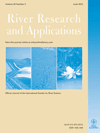
RIVER RESEARCH AND APPLICATIONS
Scope & Guideline
Bridging Research and Practice in Water Science
Introduction
Aims and Scopes
- River Ecology and Biodiversity:
Research on the ecological dynamics within river systems, including the study of fish populations, macroinvertebrates, and their habitats. The journal emphasizes the importance of biodiversity in maintaining healthy river ecosystems. - Hydrological Modeling and Management:
Investigation of hydrological processes and modeling techniques to analyze river flow regimes, sediment transport, and water quality, with applications in water resource management and flood mitigation. - River Restoration and Rehabilitation:
Studies focusing on methodologies for restoring degraded river systems, including habitat enhancement, dam removal, and the implementation of eco-engineering solutions. - Impact of Anthropogenic Activities:
Examination of how human activities, such as dam construction, agricultural practices, and urbanization, affect river systems and their ecological health. - Climate Change and Environmental Stressors:
Research addressing the impacts of climate change on river ecosystems, including alterations in flow patterns, temperature changes, and their effects on biotic communities. - Biogeomorphology and Sediment Transport:
Exploration of the interactions between biological processes and geomorphological changes in river systems, focusing on sediment dynamics and habitat formation.
Trending and Emerging
- Integrated River Management:
An increasing focus on integrated river basin management approaches that consider ecological, hydrological, and socio-economic factors to promote sustainable practices. - Use of Advanced Technologies:
Growing incorporation of remote sensing, UAVs, and advanced modeling techniques in river research, allowing for high-resolution data collection and analysis of river dynamics. - Climate Resilience and Adaptation:
Emerging research on climate resilience strategies for river ecosystems, focusing on adaptive management practices to mitigate the impacts of climate change. - Community Engagement and Citizen Science:
Rising interest in involving local communities and citizen scientists in river monitoring and restoration efforts, emphasizing the importance of public engagement in river management. - Ecological Restoration Frameworks:
Developing frameworks for ecological restoration that incorporate biogeomorphological principles and consider the interactions between physical and biological processes in river systems.
Declining or Waning
- Traditional Water Quality Assessments:
There has been a noticeable reduction in studies solely focused on traditional water quality assessments without integrating ecological or hydrological perspectives. The trend is moving towards more holistic approaches that consider ecological impacts. - Static Habitat Models:
Research utilizing static habitat models for assessing river ecosystems is waning, as there is a growing preference for dynamic, more integrative modeling approaches that account for temporal variations and ecological interactions. - Single Species Focus:
There is a declining emphasis on studies that focus exclusively on single species assessments in rivers. Current research trends favor multi-species and community-level investigations to better understand ecological interactions. - Historical Data Analysis:
Research relying heavily on historical data without contemporary validation or integration into current ecological frameworks appears to be less frequent, as the focus shifts to real-time data and adaptive management strategies. - Localized Studies:
Research that is narrowly focused on specific, localized river systems without broader ecological or hydrological context is becoming less common, as there is an increasing emphasis on comparative studies and regional analyses.
Similar Journals

Inland Waters
Fostering Collaboration for Healthy Inland WatersInland Waters, published by TAYLOR & FRANCIS LTD, stands as a prestigious scholarly journal dedicated to the critical examination of freshwater ecosystems and their management. With an ISSN of 2044-2041 and an E-ISSN of 2044-205X, this journal boasts a remarkable Q1 ranking in both Aquatic Science and Water Science and Technology for 2023, reflecting its significant impact in the field. Researchers and professionals can benefit from its comprehensive coverage of cutting-edge research, methodological advancements, and policy implications concerning inland waters. Committed to disseminating valuable knowledge in a vital area of environmental science, Inland Waters aims to foster collaboration and promote innovative solutions for sustainable water management practices. As it continues through its converged years from 2012 to 2024, the journal remains an essential resource for those dedicated to advancing our understanding and stewardship of freshwater environments worldwide.

Hydrology
Leading the way in hydrological research and innovation.Hydrology, published by MDPI, is a prominent open-access journal dedicated to advancing the field of hydrological science. Since its establishment in 2014, the journal has garnered a reputation for excellence, reflected in its classification within the Q2 quartile for 2023 across multiple categories including Earth-Surface Processes, Oceanography, Water Science and Technology, and Waste Management and Disposal. Based in Switzerland, Hydrology provides a vital platform for scholars and practitioners to disseminate research findings, promote innovative methodologies, and foster discussions on current trends affecting water resources and management globally. The journal is easily accessible online and aims to significantly contribute to the understanding of hydrological processes, offering insights that are pivotal for addressing contemporary environmental challenges. With Scopus rankings showcasing its growing influence, Hydrology is a crucial resource for researchers, students, and professionals committed to water science and sustainable practices.
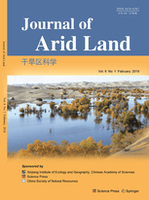
Journal of Arid Land
Transforming research into policy for arid regions.Journal of Arid Land, published by SPRINGER HEIDELBERG, is a pivotal platform dedicated to advancing knowledge in the fields of Earth-Surface Processes, Management, Monitoring, Policy and Law, and Water Science and Technology. With an ISSN of 1674-6767 and an E-ISSN of 2194-7783, this journal stands out as a prominent source of scholarly research focusing on the unique challenges and opportunities of arid and semi-arid environments, particularly relevant in the context of global climate change. As of 2023, it holds a commendable Q2 ranking in several critical categories, underscoring its impact in environmental science and related disciplines. The journal, which has been in publication since 2009 and is set to continue through 2024, provides unrestricted access to high-quality research that sheds light on sustainable practices and effective policies. With its focus on arid lands, the Journal of Arid Land plays an essential role in fostering interdisciplinary dialogue among researchers, practitioners, and policymakers striving to address the pressing issues faced by these ecosystems.
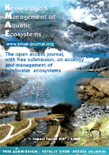
Knowledge and Management of Aquatic Ecosystems
Innovating Insights in Water Science and ManagementKnowledge and Management of Aquatic Ecosystems, published by EDP SCIENCES S A, is a premier open-access journal dedicated to the interdisciplinary study of aquatic ecosystems. With an ISSN of 1961-9502 and an impressive history since 1928, this journal serves as a vital resource for researchers and professionals in the fields of Ecology, Aquatic Science, Water Science and Technology, and Nature Conservation. The journal has consistently achieved high rankings, including a Q2 classification in multiple categories, which underscores its significant contribution to the evolving landscape of aquatic research. With access options that promote widespread dissemination of knowledge, Knowledge and Management of Aquatic Ecosystems aims to bridge gaps in research, policy, and practical applications, making it an invaluable asset for students, researchers, and policymakers aiming for impactful solutions in aquatic management and conservation.

Earth and Space Science
Fostering Discoveries that Shape Our World and Universe.Earth and Space Science, published by the American Geophysical Union, is a distinguished open-access journal that has profoundly impacted the realms of earth and planetary sciences as well as environmental science since its inception in 2014. With impressive rankings, including Q1 in both Earth and Planetary Sciences and Environmental Science for 2023, this journal ranks 38th out of 195 in the general Earth and planetary sciences category and 51st out of 219 in environmental science, showcasing its commitment to high-quality research dissemination. The journal serves as a vital platform for researchers, professionals, and students, fostering the exploration of critical topics and advancements within these pivotal fields. With an accessible format, researchers can benefit from the rich content available, furthering their knowledge and ensuring that groundbreaking discoveries reach a broader audience. The journal's ongoing commitment to open access aligns with contemporary trends in scholarly communication, emphasizing inclusion and collaboration in tackling pressing global challenges.
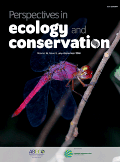
Perspectives in Ecology and Conservation
Bridging research and policy for effective environmental stewardship.Perspectives in Ecology and Conservation, published by Elsevier Science Ltd, is a leading academic journal dedicated to advancing the fields of ecology, conservation, and environmental management. With a Q1 ranking in multiple categories, including Ecology, Management, Monitoring, Policy and Law, and Nature and Landscape Conservation, this journal boasts an impressive standing among its peers, making it essential reading for researchers and professionals. Since its inception in 2017 and running through 2024, it aims to provide innovative perspectives and critical analyses that enhance our understanding and practices in conservation science. The journal is accessible through open access options, facilitating broader dissemination of knowledge. Its commitment to addressing contemporary ecological challenges reinforces its importance in the academic community, promoting sustainable practices and informed policy-making in the face of urgent environmental issues.

Water Practice and Technology
Shaping the Future of Water through Open Access ResearchWater Practice and Technology is a distinguished open-access journal published by IWA PUBLISHING, dedicated to disseminating cutting-edge research and practical insights within the field of water science and technology. With an E-ISSN of 1751-231X, the journal has been at the forefront of sharing knowledge since its inception in 2011 and has transitioned to open access in 2021, providing unrestricted access to high-quality research articles. Based in the United Kingdom, this journal plays a vital role in advancing the understanding of water resource management, treatment technologies, and environmental sustainability. As of 2023, it is categorized in the Q3 quartile for Water Science and Technology with a Scopus rank of #157/261, placing it in the 40th percentile among its peers. Researchers, professionals, and students alike will find the journal a valuable resource for the latest trends, innovations, and practical applications in the water sector, facilitating a collaborative approach towards addressing global water challenges.

Water
Fostering interdisciplinary research on global water challenges.Water, an esteemed journal published by MDPI, serves as a pivotal resource for global research in the fields of aquatic science, biochemistry, geography, and water science and technology. Since its inception in 2009, this open-access journal has committed itself to advancing knowledge regarding water-related topics by fostering a platform that encourages the dissemination of high-quality research. With its impressive impact factor reflecting its relevance and influence, Water ranks in the top quartiles in various categories, including Q1 in Aquatic Science and Water Science and Technology, showcasing its commitment to publishing cutting-edge findings that resonate deeply with the environmental and biological sciences community. Located in Basel, Switzerland, the journal prioritizes accessibility for researchers, professionals, and students alike, aligning with the broader scientific goal of addressing urgent water challenges through collaborative and interdisciplinary research.
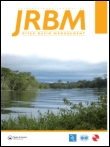
INTERNATIONAL JOURNAL OF RIVER BASIN MANAGEMENT
Fostering collaboration to tackle pressing water challenges.International Journal of River Basin Management (ISSN: 1571-5124; E-ISSN: 1814-2060), published by Taylor & Francis Ltd, is a leading peer-reviewed journal dedicated to advancing research in the critical field of water science and technology. Based in the United Kingdom, this journal focuses on the sustainable management of river basins, addressing pressing environmental challenges and promoting informed policy-making. With a commendable Q2 ranking in Water Science and Technology for 2023 and a notable Scopus Rank of #60 out of 261, the journal emphasizes the importance of interdisciplinary research and practical applications in managing riverine ecosystems. International Journal of River Basin Management provides open access options, making valuable research findings accessible to a wider audience. As it converges its inquiry from 2003 to 2024, this journal aims to enhance understanding and foster collaborative approaches among researchers, practitioners, and policymakers, establishing itself as an essential resource for those committed to innovative solutions in river basin management.

WETLANDS ECOLOGY AND MANAGEMENT
Illuminating the dynamics of aquatic ecosystems for a sustainable future.Wetlands Ecology and Management, published by Springer, is an esteemed journal that has been advancing the field of wetland studies since its inception in 1982. Operating under the ISSN 0923-4861 and E-ISSN 1572-9834, this journal is headquartered in the Netherlands and serves as a critical resource for researchers, professionals, and students alike. It fosters interdisciplinary dialogue among aquatic science, ecology, and resource management disciplines, ranking in the Q2 category for Aquatic Science and Ecology, Evolution, Behavior and Systematics as of 2023. With a notable Scopus ranking, it is positioned favorably within the 65th percentile in Ecology and a commendable 58th percentile in Aquatic Sciences. The journal emphasizes the importance of effective management strategies and policies in the conservation of wetlands, making it indispensable for those aiming to drive impactful research. Although it is not an open-access journal, its high-quality publications remain accessible through library consortia and institutional subscriptions, ensuring that pertinent insights into the ecological dynamics and sustainable management practices are available to the global research community.